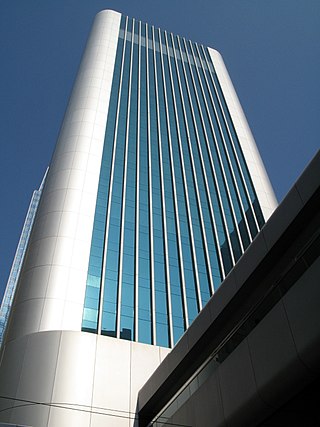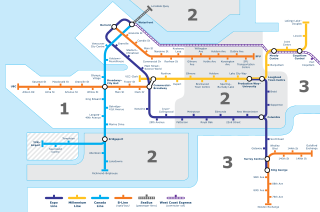RMB may refer to:
RMB may refer to:
A currency is a standardization of money in any form, in use or circulation as a medium of exchange, for example banknotes and coins. A more general definition is that a currency is a system of money in common use within a specific environment over time, especially for people in a nation state. Under this definition, the British Pound Sterling (£), euros (€), Japanese yen (¥), and U.S. dollars (US$) are examples of (government-issued) fiat currencies. Currencies may act as stores of value and be traded between nations in foreign exchange markets, which determine the relative values of the different currencies. Currencies in this sense are either chosen by users or decreed by governments, and each type has limited boundaries of acceptance; i.e., legal tender laws may require a particular unit of account for payments to government agencies.
The renminbi is the official currency of the People's Republic of China. It is the 5th most traded currency as of April 2022.
The Hong Kong dollar is the official currency of the Hong Kong Special Administrative Region. It is subdivided into 100 cents or 1000 mils. The Hong Kong Monetary Authority is the monetary authority of Hong Kong and the Hong Kong dollar.

Hang Seng Bank Limited is a Hong Kong-based banking and financial services company with headquarters in Central, Hong Kong. It is one of Hong Kong's leading public companies in terms of market capitalisation and is part of the HSBC Group, which holds a majority equity interest in the bank.

Daqing is a prefecture-level city in the west of Heilongjiang province, People's Republic of China. The name literally means "Great Celebration" and refers to the tenth anniversary of the PRC. Daqing is known as the "Oil Capital of China" and has experienced a phenomenal boom since oil was discovered at the Daqing Oil Field in 1959.

Bank of China (Hong Kong) Limited (Chinese: 中國銀行(香港)有限公司) also known as its short name Bank of China (Hong Kong) or BOCHK (Chinese: 中銀香港), is a subsidiary of the Bank of China (via a Hong Kong-listed intermediate holding company BOC Hong Kong (Holdings)). Bank of China (Hong Kong) is the second-largest commercial banking group in Hong Kong in terms of assets and customer deposits (2008 data), with more than 190 branches across Hong Kong as of the end of 2019. It is also one of the three commercial banks licensed by the Hong Kong Monetary Authority to issue banknotes for the Hong Kong dollar.
Redback, Red Back or Red-back may refer to:
The yuan is the base unit of a number of former and present-day currencies in Chinese.

Transportation in Vancouver, British Columbia, has many of the features of modern cities worldwide. Unlike many large metropolises, Vancouver has no freeways into or through the downtown area. A proposed freeway through the downtown was rejected in the 1960s by a coalition of citizens, community leaders and planners. This event "signalled the emergence of a new concept of the urban landscape" and has been a consistent element of the city's planning ever since.

Rocky Mountain is a Canadian bicycle manufacturer based in Saint-Georges, Quebec. Its name is a reference to the mountain range that stretches from eastern British Columbia to the southwest United States.

The Dudley B. Menzies Bridge is a dedicated LRT bridge crossing the North Saskatchewan River in Edmonton, Alberta, Canada. Named after Edmonton engineer and politician Dudley Blair Menzies, the bridge was the "first concrete segmental box girder bridge in Western Canada". The main deck carries two tracks of the LRT system connecting Government Centre station and the University station. A walkway for pedestrians and bicycles hangs beneath the main spans of the bridge over the river.
Halifax commonly refers to:

The Old Fall River Road, sometimes referred to as "The Old Road" by park staff in Rocky Mountain National Park, was the first automobile road to penetrate the interior of the park. The road linked the east side of the park near Estes Park with Grand Lake on the west side. Work began in 1913 but was interrupted in 1914 by World War I with final work being completed between 1918 and 1920.
The monetary policy of China aims to keep the value of the Renminbi, the official currency of the People's Republic of China, stable and contribute to economic growth. Monetary policy concerns the actions of a central bank or other regulatory authorities adopt to manage and regulate currency and credit in order to achieve certain macroeconomic goals.
Infinity Group is a private equity fund backed by China Development Bank and Clal Industries. The head of Infinity Group is Amir Gal-Or. Infinity Group manages RMB 10 billion and 100 portfolio companies, through 17 local RMB funds throughout China.
Since the late-2000s, the People's Republic of China (PRC) has sought to internationalize its official currency, the Renminbi (RMB). RMB internationalization accelerated in 2009 when China established the dim sum bond market and expanded Cross-Border Trade RMB Settlement Pilot Project, which helps establish pools of offshore RMB liquidity. The RMB was the 8th-most-traded currency in the world in 2013 and the 7th-most-traded in early 2014. By the end of 2014, RMB ranked 5th as the most traded currency, according to SWIFT's report, at 2.2% of SWIFT payment behind JPY (2.7%), STG (7.9%), EUR (28.3%) and USD (44.6%). In February 2015, RMB became the second most used currency for trade and services, and reached the ninth position in forex trading. The RMB Qualified Foreign Institutional Investor (RQFII) quotas were also extended to five other countries — the UK, Singapore, France, Korea, Germany, and Canada, each with the quotas of ¥80 billion except Canada and Singapore (¥50bn). Previously, only Hong Kong was allowed, with a ¥270 billion quota.
A Schengen bond is a bond denominated in offshore Renminbi, and more specifically refers to bonds listed on the Luxembourg Stock Exchange and issued by a Chinese company.
The 2015-2016 Chinese stock market turbulence began with the popping of the stock market bubble on 12 June 2015 and ended in early February 2016. A third of the value of A-shares on the Shanghai Stock Exchange was lost within one month of the event. Major aftershocks occurred around 27 July and 24 August's "Black Monday". By 8–9 July 2015, the Shanghai stock market had fallen 30 percent over three weeks as 1,400 companies, or more than half listed, filed for a trading halt in an attempt to prevent further losses. Values of Chinese stock markets continued to drop despite efforts by the government to reduce the fall. After three stable weeks the Shanghai index fell again on 24 August by 8.48 percent, marking the largest fall since 2007.
Dim sum is a type of cuisine, a range of small dishes in small pieces served typically for breakfast, brunch, lunch, in Cantonese cuisine.

Digital renminbi, or Digital Currency Electronic Payment, is a central bank digital currency issued by China's central bank, the People's Bank of China. It is the first digital currency to be issued by a major economy, undergoing public testing as of April 2021. The digital RMB is legal tender and has equivalent value with other forms of renminbi, also known as the Chinese yuan (CNY), such as bills and coins.